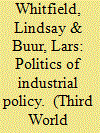| Srl | Item |
| 1 |
ID:
128466


|
|
|
|
|
| Publication |
2014.
|
| Summary/Abstract |
Economic transformation is driven by successfully implemented industrial policy, but industrial policy is inherently political. We cannot understand why some governments pursue and implement industrial policy better than others without understanding its politics. This article addresses the conditions under which industrial policies are successfully implemented. It presents an analytical approach to understanding why some ruling elite-capitalist alliances lead to better economic outcomes than others. Sub-Saharan African countries present a particular puzzle, given their low productive capabilities and the relatively small number of successful productive sectors. The article examines the most successful productive sectors in Mozambique and in Ghana in order to illuminate the conditions under which such alliances occur and their specific characteristics and outcomes.
|
|
|
|
|
|
|
|
|
|
|
|
|
|
|
|
| 2 |
ID:
168274


|
|
|
|
|
| Summary/Abstract |
The success of Kenya’s garment export sector relative to other African countries challenges a growing pessimism regarding the prospects of devising and implementing industrial policy in contemporary Africa, particularly in contexts characterized by Competitive Clientelism. Kenya became sub-Saharan Africa’s fourth largest exporter of garments by value during the last two decades, catching up with major players like Lesotho and South Africa while converging on the two largest exporters, Mauritius and Madagascar. Nuancing existing explanations for the sector’s growth, which emphasize external factors like trade regimes and donor interventions, this article assigns a central role to the state and the balance of power that underpins it. The interests of key actors within Kenya’s political settlement aligned in a way that allowed the country’s Export Processing Zones (EPZ) programme to be relatively insulated from political pressures, giving the Export Processing Zones Authority (EPZA) sufficient autonomy and coordination capacities to administer a highly-conducive business environment for predominantly foreign garment firms. However, while the sector’s employment and foreign exchange contributions have ensured ongoing political support, the resulting increase in garment firms’ holding power has made them more assertive in demanding policies that are not only decoupled from learning processes, but detrimental to other industry players.
|
|
|
|
|
|
|
|
|
|
|
|
|
|
|
|